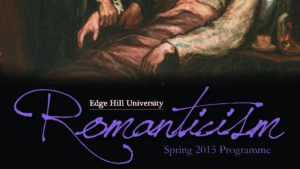BARS/NASSR 2022: New Romanticisms
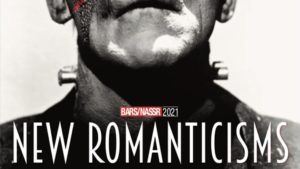
‘New Romanticisms’ invites explorations of both the concept of newness in and about the Romantic period and new approaches to Romantic Studies today. The title for the conference also plays on the term ‘New Romantics’, referring to post-punk bands of the late 1970s and 1980s influenced by Romantic-period aesthetics, especially ‘dandy’ fashions (roughly equivalent to ‘new wave’ artists in America). The conference organisers are therefore particularly interested in responses to the call for papers which think about Romantic legacies and receptions in music, theatre, pop culture, and beyond. We would also welcome areas of research distinct from literary and cultural studies, which might include, but is not limited to: art history, material culture, cultural heritage, public engagement, and knowledge exchange.
This conference has been delayed by the COVID-19 pandemic and, therefore, its focus on the new feels more urgent than ever. What does it mean to study Romanticism today? How can Romantic Studies appropriately and effectively respond to current debates about the relevance and future of Higher Education, social justice, climate change, and contemporary culture more generally? Papers reflecting on the pressures on research, teaching, and service intra- or post-pandemic are particularly welcome. The conference aims to be an open, inclusive, accessible, and diverse space for the discussion of newness in Romantic Studies and its legacies and impact today.
The conference will take place in hybrid format, with physical panels, keynotes, and workshops, also available in digital format, taking best practice from online events into the running of the joint conference.
The physical event will take place at Edge Hill University, with Thursday 4th August devoted to an exploration of Liverpool and its Romantic history and legacies. As Liverpool was a hub for both advocates of slavery and abolitionists, as well as radical political agitation more generally from Dissenters to Chartists, papers which respond to the history of slavery and abolition, maritime and radical cultures, and the wider significance of England’s North-West on the Romantic period, will also be welcome.
Please submit abstracts of 250 words, panel proposals of 750 words (including details of individual papers plus a rationale for the panel), or innovative presentation formats of 500 words (including, for example, poster presentations, pedagogical workshops, salons, and dramatic and/or musical performance pieces) to [email protected].
Please include an indication of whether your presentation / panel / innovative presentation format is intended to be hosted online (and asynchronous or synchronous).
Virtual Seminar Series 2022
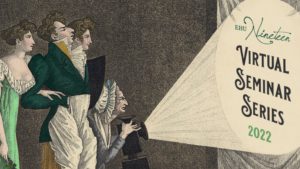
Dr Clare Clarke (Trinity College Dublin) — ‘A Shrine of Pilgrimage: Dark Tourism in Late Victorian Newspapers’ Ripper Reportage’
Pre-Recorded talk: available at sign-up.
Live Q&A: Thursday, 5 May, 6pm GMT
Breaking Barriers: Nineteenth-Century Visual Culture in the Woke Age

MeToo, BLM, LGBTQ+ rights, Extinction Rebellion – these are just some of the social movements that have contributed to the woke age. Moments of great change and reflection often make us think about our own social responsibility, be that our historical research, or what kinds of history we’re interested in. The long nineteenth century was also a time of furious debate, intense anxiety, and substantial progress, but its outdated views on gender, race and other pressing social issues remain in the visual epitaphs all around us, from statues to monuments, buildings to paintings. It is our social responsibility to rethink these objects and consider how they are represented and interpreted in the now.
This collaborative event will do just that. Edge Hill University and The British Association of Victorian Studies are pleased to welcome speakers from a range of backgrounds to talk about how their research on long-nineteenth-century visual culture interacts with changing social attitudes and ideas, considering the uncomfortable, problematic and even liberating experience of re-evaluating art and its legacies.
A special thanks to The Atkinson for their support and use of collections, and the Henry Moore Institute for their affiliation.
Organisers:
Dr Emma Butcher and Dr Melissa Gustin
Speakers:
Dr Laura Eastlake (Edge Hill University) . Pre-recorded keynote and Zoom Q&A
The Victorians and Cleopatra: Unwriting the Greatest (Orientalist) Love Story Ever Told
Dr Onyeka Nubia (University of Nottingham)
The Africans of Georgian Britain: active agents of change in the ‘golden age’ of ‘reason’ and ‘enlightenment.’
Prof Patricia Pulham (University of Surrey)
Touching Statues: Reading 19thC Narratives of Sexual Violation in the MeToo Era
Dr Nicole Cochrane (University of Exeter, BAVS/BARS 19C Matters Fellow)
Bonaparte in Britain: Popularity, Propaganda and the Lives of ‘Great’ Men
Gemma Shearwood (University of York)
New perspectives on photographs of John Flaxman’s memorial to William Murray, 1st Earl Mansfield
Spooky Season 2021

As the nights darken, join us for a season of talks, film screenings, and performances celebrating the spookier side of the nineteenth century.
Virtual Seminar Series 2021 – 2022
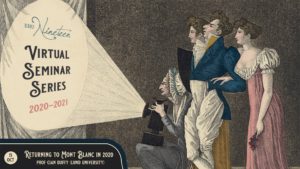
Our seminar series for 2020-2021 will take place virtually via pre-recorded talks and live Q&A discussions on Zoom. To learn more about these events, and to book your free tickets, please follow the Eventbrite links below.
15 October 2020 — ‘Returning to Mont Blanc in 2020’, Prof Cian Duffy (Lund University)
“For the last 20 years, I’ve been spending summers in Chamonix. For much of that same time, I’ve been writing about the role of Chamonix in Romantic-period literature. In this talk, I reflect on going back to that place and back to those texts in 2020”.
Click here to watch Prof Cian Duffy’s talk on YouTube
Click here to watch the Q&A recording on YouTube
3 December 2020 — ‘Careless John Clare’, Dr Erin Lafford (University of Derby)
“This talk considers how Clare explores the aesthetic, emotional, and ethical facets of carelessness. It asks what negligence has to do with writing poetry at the same time as it examines how Clare wrote about the social and ecological consequences of not caring”.
Click here to watch Dr Erin Lafford’s talk on YouTube
Click here to watch the Q&A recording on YouTube
10 February 2020 — ‘Mars in the Magazines’, Dr Will Tattersdill (University of Birmingham)
“This is a talk about Mars in the 1890s – the Mars of H. G. Wells, with which War of the Worlds (1897) remains one of the most famous imagined communications. It wasn’t the only one, though. Here I’m going to discuss a serious proposal for actual real-life Martian communication made by the eugenicist and statistician Francis Galton (1822-1911). Putting it alongside Wells, I hope to provoke thought on the relationships between science, fiction, and the periodical press of the fin de siècle”.
Click here to watch Dr Will Tattersdill’s talk on YouTube
Click here to watch the Q&A recording on YouTube
Wednesday 10 March 2020 — ‘Performing Egyptian Magic’, Dr Eleanor Dobson (University of Birmingham)
“This talk explores ancient Egyptian imagery in Victorian performance magic, and ancient Egyptian magic in nineteenth-century literature, to unearth a culture that saw cutting-edge imaging techniques repeatedly aligned with antiquity. It also charts ancient Egyptian presences in magic lantern slides, photographs, and early moving pictures, illuminating a particular visual strand in a longstanding cultural tradition in which ancient Egypt is read as byword for magic”.
Click here to watch Dr Eleanor Dobson’s talk on YouTube
Substance Use and Abuse in the Long Nineteenth Century
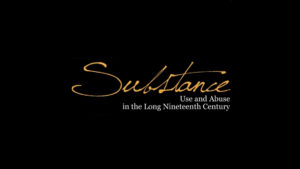
This two day interdisciplinary conference examined the changing roles of drugs and chemical substances in the history, literature, and medical discourses of the long nineteenth century.
Speakers:
Professor Susan Zieger, University of California Riverside
Dr Noelle Plack, Newman University
Dr Douglas Small, University of Glasgow
For full details see http://[email protected]
Romanticism Goes to University
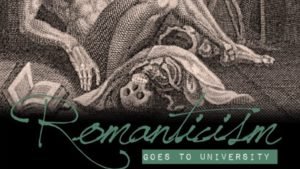
A two day Symposium, hosted by Romanticism @ Edge Hill University, including workshops on editing the Romantics, teaching Romanticism, digital humanities, and impact in and of long nineteenth century studies
19th-20th May 2018
Byron’s bear, kept in his student room to challenge the ban on pets – Shelley’s expulsion from Oxford, for refusing to recant the atheism expressed in his provocative pamphlet – Victor Frankenstein as the undergraduate from hell – women writers debarred from university tuition but developing new models of mentorship in relation to Dissenting academies and other institutions: the university has an awkward reputation within Romantic period writing, becoming a symbol of authority and tradition to be resisted and challenged. On the other hand, ‘Higher Education’, broadly considered, occupies a significant space within Romantic thought, offering the potential for self-betterment and social improvement in revolutionary ways, from poetry embodying a radical call to arms and prose reconceptualising individual and national identity to print culture more generally offering a newly democratic public space of opinion formation.
‘Romanticism Goes to University’, a two day symposium hosted by Romanticism @ Edge Hill University, aims for a two-fold focus: firstly, a space for discussion and debate about the role of higher education – pedagogy, didacticism, the Romantic lecture and essay, and the university as an institution – in the Romantic period itself; and secondly, an opportunity to scrutinize the state of the discipline in today’s university: what does it mean to teach and research Romanticism now? How is the Romantic period presented in undergraduate and postgraduate programmes? What are the major trends in Romantic research at the moment? To what extent does what is taught in Romantic period courses reflect and / or motivate research?
Alongside academic papers and panels, our symposium will offer a space to discuss teaching and research concerns through a mixture of expertly led workshops and roundtable discussions. These workshops will be of especial interest to Postgraduate and Early Career Researchers, although more established staff would be more than welcome to attend.
Keynote Speakers and their Workshops:
Prof. Anthony Mandal, Cardiff University: Editing the Romantics
Dr. Katie Garner, University of St. Andrews: Teaching Romanticism
Prof. Judith Pascoe, Florida State University: Digital Romanticism
Prof. Alice Jenkins, University of Glasgow: Post-Romantic Impacts
Proposals for individual papers, panels of 3 speakers and a chair, or innovative presentation formats, are invited on the following topics (although they are certainly not limited to them):
- the Romantic University as institution: authority, tradition, renewal, resistance, challenge
- education in the Romantic period: children’s literature, pedagogy, didacticism, self-improvement, social development, democracy, alternatives to traditional educational spaces
- the Romantic lecture and / or the Romantic essay: creative non-fiction, oral culture, table talk, conversation
- poetry, prose, and print culture with educational and / or otherwise transformative aims
- the Romantic period in the undergraduate and / or postgraduate classroom: canonicity, representation, diversity, the challenges of the Teaching Excellence Framework, student satisfaction and its alternatives, employability
- impact and public engagement with a Romantic period / long nineteenth century focus
- new approaches to Romantic studies, including, but not limited to: digital humanities, the spatial turn, the international turn, the affective turn, medical humanities and disability studies
- publishing and / or editing in and on the Romantic period
Please submit abstracts of 250 words for individual papers, or panel proposals / innovative presentation formats of 500 words (including a brief introduction and details of each paper), along with a short biography of presenters, to [email protected] by Friday 2nd February 2018.
There will be the opportunity for selected papers to be revised for a special edition of Romantic Textualities, as well as the publication of themed entries in the blog series ‘Teaching Romanticism’.
Edge Hill University has an excellent reputation for teaching and research in Romantic Studies. ‘’Romanticism Goes to University’ will build on the success of our previous symposia, ‘Edgy Romanticism’ (2016) and ‘Romanticism Takes to the Hills’ (2017), as well as the Romanticism @ Edge Hill research seminar series (EHU 2010-present) and our postgraduate conferences, co-hosted with Keele University: the Student Byron Conferences (EHU 2011-13), ‘Byron and the Romantic World’ (Keele 2016), and ‘Writing Romantic Lives’ (EHU 2017).
Romanticism Takes to the Hills
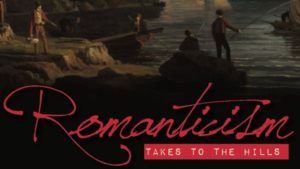
Edgy Romanticism
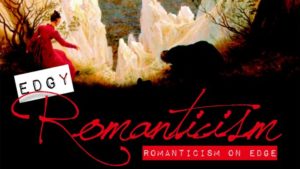
Romanticism Seminar 2018
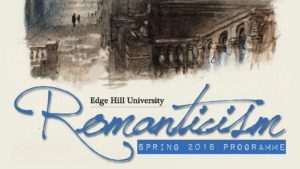
Victorians Seminar 2017

Romanticism Seminar 2017
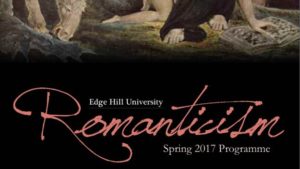
Romanticism Seminar 2016
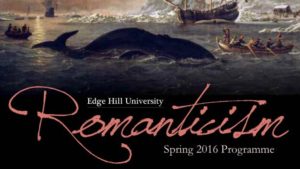
Romanticism Seminar 2015
